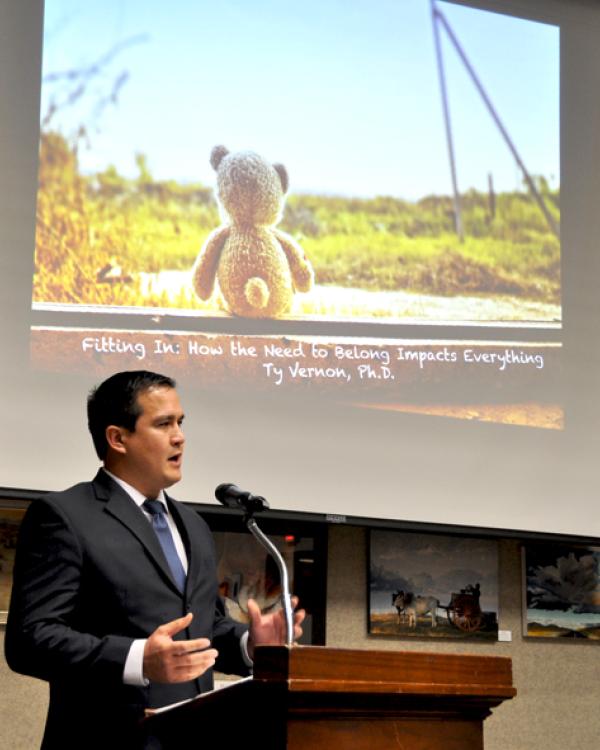
Ty Vernon giving a presentation at the Gevirtz School's "Fast & Curious" event in February 2017
Vernon announces new therapy and fundraising initiatives
Dr. Ty Vernon, clinical psychologist and autism expert, assumed the role of Director of the Koegel Autism Center at the University of California, Santa Barbara at the start of July 2017. He has a bold new vision for the Center and plans to roll out several new initiatives in the coming months.
Vernon assumes leadership at the Koegel Autism Center as Dr. Robert Koegel moves into a position as Founding Director as he transitions to a move to Stanford University. Koegel, currently a Distinguished Professor in both the Department of Counseling, Clinical, and School Psychology and the Department of Education, has directed the ground-breaking Center since 1980.
“We will be working hard to connect with local families, establish partnerships with the community, and create some of the very best autism intervention programs in the world,” Vernon says. “My team is dedicated to accomplishing an ambitious goal—soon, anyone will be able to walk through the doors of our Center and immediately be enrolled in an exceptional intervention program.”
The new director will lead a staff composed of 12 graduate student researchers and over 30 undergraduate research assistants, all with expertise in both clinical psychology and special education. They have diverse research interests that include early identification, parent support, social engagement strategies, school-based interventions, and adult transitions.
“Drs. Bob and Lynn Koegel have been important members of our academic community for decades,” says Gevirtz School Dean Jeffrey Milem about this transition. “Their contributions to GGSE, UCSB, and the local, national, and international communities have been remarkable. We wish them well as they begin this next chapter in their professional lives.
“I am very pleased that Dr. Ty Vernon has accepted our offer to become the new director of the Koegel Autism Center,” Dean Milem continued. “I am confident that he will lead the Center forward by building upon the outstanding work that Koegels have done and move the work of the Center forward with cutting edge clinical services and outstanding research that contribute to the local, national, and international communities.”
Vernon was trained in autism intervention, assessment, and research methods by two well-known institutions: UCSB’s Koegel Autism Center and the Yale Child Study Center’s Autism Program. He received his Ph.D. in Clinical Psychology from UCSB before continuing on to complete a two-year autism fellowship at Yale. After returning to Santa Barbara to join the Department of Counseling, Clinical, and School Psychology as an Assistant Professor, he served as the director of the autism assessment clinic prior to transitioning to his new role as Director of the Koegel Autism Center.
Anna Krasno, Ph.D., will join the Center’s leadership team and serve as the Center’s new Clinical Director. Krasno, a clinical psychologist and autism expert, was a former Donald J. Cohen fellow at the Yale University Child Study Center, a UCSB doctoral student, and a psychology intern at Stanford University/Children’s Health Council. She will be responsible for designing and implementing the Center’s clinical service initiatives, along with overseeing the clinical training and supervision of all autism center staff.
The Koegel Autism Center has an established history of being a leader in developing and providing positive, strength-based interventions for children with autism. It is one of the sites that developed the Pivotal Response Treatment (PRT) intervention model, a highly effective naturalistic behavioral therapy that revolutionized autism treatment. Vernon plans to enhance the research efforts of the Center, building on a recent research grant funded by Autism Speaks. He says, “Our recent empirical work has focused on modifying the PRT model to focus on targeted social engagement opportunities, which in turn has a transformative effect on parent-child connections and subsequent development.”
The Center also intends to expand its focus on the needs of older individuals on the spectrum. Working with his team of doctoral students, Vernon developed the Social Tools And Rules for Teens (START) and Social Tools And Rules for Transitions (START for Adults) intervention models with funding from the Organization for Autism Research. The START programs target both social motivation and social competence in an engaging and immersive peer environment.
“As individuals with autism grow up, they face daunting new interpersonal challenges,” Vernon explains. “They must navigate an increasingly complex set of unwritten social rules as they attempt to maintain friendships, establish romantic relationships, interview for jobs, and interact with professors and work supervisors. We designed the START program to make this transition much easier for them.”
To support the Center’s bold new vision, Vernon discussed the launch of an ambitious fund-raising initiative. He explained, “We specialize in the development of high-impact approaches built on client’s strengths, and have a number of really exciting programs that we can’t wait to roll out in the coming years. Often, funding is the only barrier preventing us from piloting a new, potentially life-changing intervention approach. We are looking to partner with donors in the community who share our vision and can help us get these new transformational programs off the ground.” Vernon’s ultimate goal is to establish an endowment for the Center so that local and global autism communities can continue to benefit from the research breakthroughs of the Center.
Ultimately, Vernon described the Center’s relationship with the local community as its most valuable asset: “We absolutely love the local families with whom we get to work. They are the reason we are in this field. When we can work with parents and professionals to address a child’s challenges and highlight their strengths, there is no limit to that child’s potential.”